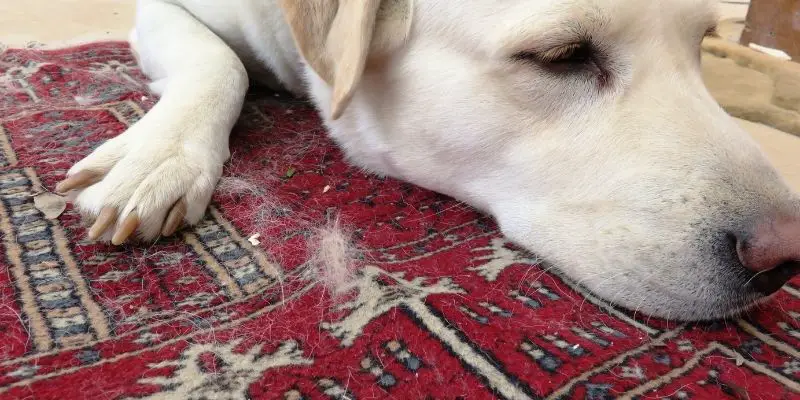Ah, doggies. Our favorite animal in the whole entire world. Or is that just me?
Regardless, as much as we love our pets, the one thing that most of them do that can be a bit of a headache is the smell. It’s not their fault! You can wash them regularly to keep that to the minimum, but they still emit an odor that gets absorbed by most of the things they stay around. That might be their blanket, your bed, or the carpet. And it’s even worse if your dog has just come out of the rain or a lake and is sopping wet! The wet dog smell is a rather strong one!
What makes the carpet picking up their scent quite troublesome is that you can’t toss one in the washer like you might do other things! So, you might have asked yourself multiple times how to get the dog smell out of the carpet. Well, if that’s what you’re looking for, you’ve come to the right person!
Dog smell is natural, of course, but don’t worry, you can definitely get your dog’s scent out of the carpet with the right products and a little know-how. This article is here to show you how to remove pet odor from carpets.
Do you have a specific question about removing the dog smell from the carpet? Then use the table of contents below to jump to the most relevant section. And you can always go back by clicking on the black arrow in the right bottom corner of the page. Also, please note that some of the links in this article may be affiliate links. For more details, check the Disclosure section at the bottom of the page.
Here's what we'll cover:
Why is the dog smell on the carpet a problem?

Well, think of it this way. A carpet tends to be thick and heavy. It means that you probably won’t be able to toss it into the washer for a quick clean. If you decide to wash it, you will most likely have to take it outside, give it a thorough scrub, and then let it dry.
Now, here’s another scenario. Imagine that your carpet smells like a dog, but you leave it inside. Sure, you might get used to it, but it’s definitely not a great smell to hang around for too long. If you end up having guests or visitors come around, they will be met immediately by the pungent, strong smell of dog. That’s definitely not an experience that many would describe as hospitable.
Look, to have a fresh-smelling home and a carpet that smells and looks great, you should aim to find a way to get those pet odors in carpets out of them. Some dogs are more smelly than others, so some breeds will definitely have you cleaning more frequently. Don’t worry. I’ve got your back, and I’m going to show you the best ways to get that done.

How to remove pet odor from carpet with baking soda?
This is one of the most valuable tricks that I know when cleaning up after your dog in the house. The best part is that this trick will work for other animals too, and pretty much anything that will knock stench into the thick fibers of your carpet.
To get the dog smell out of the carpet using baking soda, it’s rather straightforward. Baking soda is a deodorizer. If your dog has decided to take a leak on the spot on the carpet or just likes to lie in the same place on it (until it picked up its scent), then all you need to do is sprinkle the baking soda in that spot. Leave it for about 20 minutes or more if you can, and then vacuum it right up. Go ahead, give it a whiff. The dog smell on the carpet will be gone, and that’s one of my favorite tricks.
The best part of this is that it requires nothing to be wet, so you don’t need to wait for anything to dry! Just deodorize in spots, and you’re good to go! You can also apply baking soda to your dog’s coat to give it a ‘dry bath.’ Leave it in for about 10 minutes, then brush it out!

Another way of how to get dog smell out of carpet naturally
Okay, so you want some other natural means to get that characteristic old dog smell out of your carpet without using chemicals? Although it still involves baking soda, one way to get the dog smell out of carpet and stains can be a mixture of baking soda and vinegar.
Mix equal amounts of vinegar and baking soda together, shake them up, and soak the area in question with the solution you’ve made. This will get rid of that smell even better than baking soda alone and help break down any stains left in your fancy carpet.
You can also make use of lemon juice with a little bit of water. Just scrub it into the smelly spot and blast it with your steam cleaner and a little detergent.
It’s best to avoid steam cleaning on its own, by the way. You might notice your carpet smells like a dog after steam cleaning. And that’s because sometimes the heat from the process can actually bond these odor molecules to the carpet, making it even harder to get out!

Best way to get dog smell out of carpet using the products?
Now, if you don’t mind using cleaning products to get that smell out, then you’ve got some excellent options.
For instance, is pretty awesome. You just have to mix a little bit of this potent concoction into a spray bottle and dilute it with a bit of water. Spray the smelly spots and leave the product to do its magic. Not only does this get rid of the smell, but my goodness, it smells brilliant. It smells like pure, fresh oranges, and that is fantastic.
Another option is . It doesn’t matter whether it’s cat pee or dog pee. Any pee or anything that your pet leaves behind that smells will be destroyed by this fantastic product. The major downside is that you need to pour it into a carpet cleaner machine (of course, Hoover would prefer you use one of their own). If Angry Orange is too strong for you, this is milder and still smells good.
Thanks for the blog graphics: Canva.com

Thanks for the blog graphics: Canva.com
Doghint.com is a participant of several affiliate programs. The list includes (but not limited to) the following: VigLink, Refersion, ShareASale, and Amazon Services LLC Associates Program, an affiliate advertising program designed to provide a mean for us to earn fees by linking to Amazon.com and affiliated sites. Doghint.com does not intend to provide veterinary advice. All published articles are meant for informational purposes only and not substitute the professional veterinary consultation.


